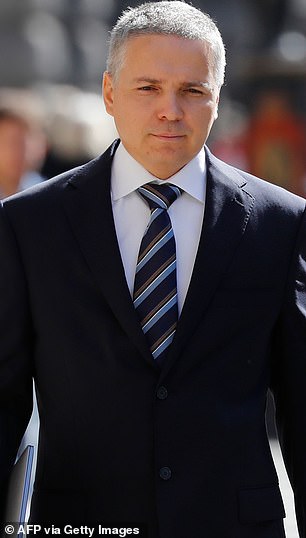Russian businessman loses libel battle against Christopher Steele for claims in ex-MI6 spy’s Trump ‘dirty dossier’ that claimed tycoon was involved in hacking Democrats
- Aleksej Gubarev sued Mr Steele for making ‘seriously defamatory allegations’
- Judge ruled today Mr Steele was responsible for publication of the 2017 dossier
- Claims made in the Democrat-funded dossier have been roundly rubbished
A Russian businessman has lost his libel battle against ex-MI6 spy Christopher Steele whose ‘dirty dossier’ on Donald Trump implicated him in hacking the Democrats.
Aleksej Gubarev sued Mr Steele for ‘seriously defamatory allegations’ that he had ‘knowing involvement’ in the DNC computer hack during the 2016 US election.
But a High Court judge today ruled that the tycoon did not prove Steele was responsible for the report’s publication and so could not be made to pay damages.
Central accusations made in the dossier, which was funded by the Democrats, have been roundly rubbished and were largely thrown out by the Mueller report.
It was published by the Buzzfeed news website in 2017 and contained outlandish claims of Trump hiring prostitutes in a Moscow hotel room as well as allegations of Russian collusion with the Republican candidate’s campaign.

Russian businessman Aleksej Gubarev (left at trial in July) has lost his libel battle against ex-MI6 spy Christopher Steele (right, in July) whose ‘dirty dossier’ on Donald Trump implicated him in hacking the Democrats.
Mr Gubarev and his company Webzilla took legal action against Mr Steele and his intelligence company Orbis Business Intelligence after the dossier was published.
But in a High Court judgment delivered remotely this morning, Mr Justice Warby dismissed Mr Gubarev’s claim.
The judge said that references to Mr Gubarev in the Steele dossier were ‘defamatory of Mr Gubarev at common law, and its publication in this jurisdiction and the EU caused serious harm to his reputation’.
However he added: ‘He would have been entitled to substantial damages, if he had proved that the defendants are responsible in law for the publication complained of.
‘But he has failed to prove that. So, Mr Gubarev’s claim must be dismissed.’
The judge said Webzilla’s claim against Mr Steele and Orbis ‘must also be dismissed for the same reason’.
Mr Gubarev brought a defamation suit against Buzzfeed in 2018 in Miami but the judge ruled in the news website’s favour.

Mr Gubarev sued Mr Steele for ‘seriously defamatory allegations’ that he had ‘knowing involvement’ in the DNC computer hack during the 2016 US election
At trial in July Mr Gubarev’s barrister Andrew Caldecott QC argued that the ‘sensational’ allegations in the Steele dossier created ‘an obvious likelihood of serious financial loss’.
He also argued that Mr Steele and Orbis were ‘responsible in law’ for BuzzFeed’s publication of the Steele dossier, which he said was produced for the ‘Democratic National Committee and/or Hillary Clinton’s presidential election campaign’.
Mr Steele told the court of his ‘shock and horror’ at what he described as BuzzFeed’s ‘reckless’ and ‘irresponsible’ publication of the dossier, which his lawyers said the news website was ‘unauthorised’ to publish.
However he stuck by his claims and said the information he had gathered suggested the Trump administration might pose a ‘serious risk’ in relation to the receipt of intelligence involving Russia, and that he was ‘duty bound’ to provide it to the authorities.
Trump rubbished the allegations as ‘fake news’ when they first emerged shortly into his presidency.
Special counsel Robert Mueller all but dismissed Mr Steele’s findings into Russian collusion.

